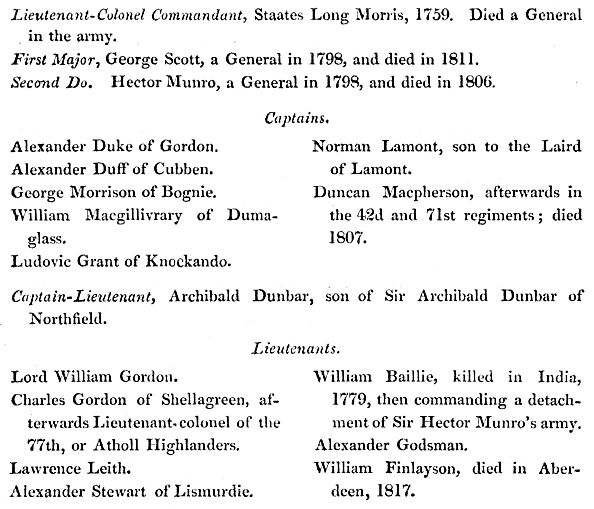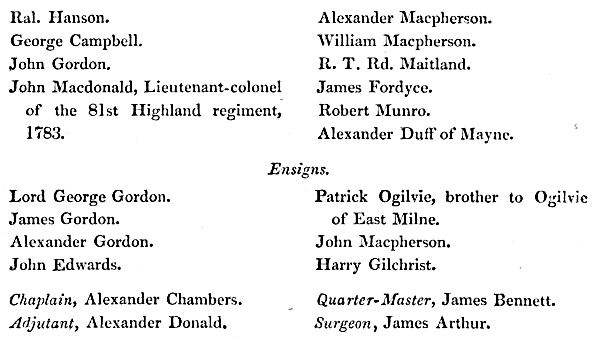|
| |
|
Sketches of The
Character, Manners, and Present State of the Highlanders of Scotland |
|
Military Annals of the Highland
Regiments
Eighty-Ninth,
or
Gordon Highland
Regiment
1759
The ease and rapidity with which the ranks of
Fraser's and other Highland regiments had been recruited, encouraged Mr
Pitt to follow up his plan of giving commissions to the gentlemen of the
Highlands, and of employing the young and active in his Majesty's
service. With this view, Major Staates Long Morris (who had married the
Duchess Dowager of Gordon) received instructions to raise a regiment in
those parts of the Highlands where the influence of the Gordon family
prevailed; and, as an inducement to the youth of the North to join this
regiment, the Duke, then very young, was appointed captain, Lord William
Gordon a lieutenant, and Lord George an ensign.
The political influence of the Duke of Argyll being
at that period, very great in Scotland, few important measures passed
without his concurrence. In this case, however, George
II. appointed Major Morris, at the
solicitation of the Duchess. She dreaded the authority of Argyll, (who
was anxious to direct the local influence of the Gordon
family in the minority of the Duke), and considered the names of her
sons indispensably necessary to secure success in raising men. She was a
native of the country, being a daughter of the Earl of Aberdeen,
understood well the feelings and characteristic prejudices
of the people, and knew how to work on
them. She represented the youth of her son, and the danger that would
result should his political influence, in his minority, be directed to
another family, and especially to that family between which and her own
so many ancient feuds had subsisted, the seeds of which still remained,
if not in the minds, at least in the traditions of many. Greater
exertions were, in consequence, made to support what the Duchess called
the cause of her son, and the honour of his family. This attempt was
successful. In a few weeks 960 men assembled at Gordon Castle, and
marched to Aberdeen in December 1759, when the following officers were
appointed.


The regiment soon marched from Aberdeen for
Portsmouth, embarked there for the East Indies in December 1760, and
reached Bombay in November 1761.
The Duke of Gordon left College with the intention of
embarking with his friends for the East Indies. This spirited
resolution, however, was checked by George II.,
who recommended to the Duchess to send her son back to finish his
education. There being only nine Dukes in the kingdom of Scotland, he
could not, he said, suffer him to leave his native country, and,
commending his spirit and patriotism, he added, that he had more
important services in view for him than any he could perform as captain
of a company in the East Indies. This advice, so like a mandate, was of
course followed, and the Duke remained at home.
After the 89th had been stationed in different parts
of India, Major Hector Munro, with a strong detachment of the regiment,
joined the army under the command of Major Carnac, in the neighbourhood
of Patna, at a very critical period, a considerable portion of the
troops being then in open mutiny. Major Munro succeeded Carnac in the
command, and being well supported by his own regiment, his decision and
firmness completely crushed the mutiny, and saved the army. Twenty-five
of the ringleaders were tried on the spot, eight of them blown from the
mouths of the cannon, and the rest sent for execution to other
cantonments.
A proper state of discipline being thus established,
the commander was enabled to meet the enemy at Buxar on the 23d of
October 1764, when he completely overthrew and dispersed a force nearly
five times more numerous than his own. The enemy left on the field 6,000
killed, and 130 pieces of cannon, while the loss on the part of the
victors was almost too trifling to be mentioned; amounting to 2
officers, and 4 rank and file killed, of his Majesty's troops.
The casualties among the Company's troops were more in proportion to
their number, but the whole afforded sufficient proof of the low state
of the Native armies at that period.
The victory was complete, and highly important in its
results, and was the more honourable to Major Munro, (who was
immediately promoted to the brevet rank of Lieutenant-Colonel), as he
had gained the battle with troops who had been recently in such a state
of insubordination. In a letter from the President and Council of
Calcutta to Major Munro, it is said, "The signal victory you gained, so
as at one blow utterly to defeat the designs of the enemy against these
provinces, is an event which does so much honour to yourself, Sir, in
particular, and to all the officers and men under your command, and
which, at the same time, is attended with such important advantages to
the Company, as call upon us to return you our sincere thanks."
The regiment was soon afterwards ordered to Britain,
and in the year 1765 was reduced. This uncommon circumstance attended
their service, that, although five years embodied, four of which were
spent in India or on the passage going and returning, there was neither
death, promotion, nor any change whatever among the officers, except
that of Lieutenant Lord William Gordon promoted to the 67th regiment,
and that of his successor to his lieutenancy.
There was another circumstance more remarkable, and
in itself highly honourable to this respectable corps, and which rests
upon the best authority, that out of eight companies raised by the Duke
of Gordon, Major Munro, and Captains Macgillivray, Grant, Macpherson,
and others, in all 780 men, not a man was brought to the halberts, or
deserted during these five years. Of the whole regiment there were only
six men brought to corporal punishment. When soldiers exhibit such
fidelity to their trust, and such principles regulating their conduct,
it were desirable that a less ignominious punishment could be
substituted for that personal castigation, so humiliating and degrading
to the feelings, and the infliction of which generally destroys all
sense of shame and honour, and renders a man indifferent to his future
conduct. The difficulty consists in finding a proper substitute. Care
ought, however, to be taken that degrading punishments be inflicted only
on men who have already lost their character, and on whose obdurate
feelings no other motive than simple pain is capable of acting with
sufficient force. The foundation of a system, calculated to surmount
this difficulty, and to establish modes of punishment sufficient to
operate as a check on the depraved, without annihilating their sense of
shame, is a subject equally important, difficult, and desirable. Much
will depend upon officers capable of understanding the feelings, and
making due allowance for the casual infirmities of human nature, and
possessing the firmness and decision necessary to control and overawe
the turbulent and incorrigible. Many good soldiers have been ruined by
the infliction of infamous punishments, while to men of such bold
spirits and depraved minds, as frequently enter our army, the terror,
and often the infliction of severe punishments are absolutely necessary.
|
|

